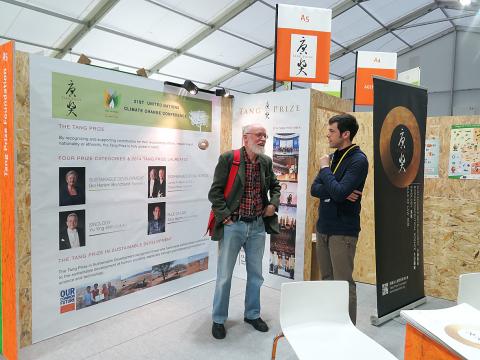Taiwan’s government representatives may not have been allowed to participate in the negotiation process at the Paris Climate Change Conference, but civic society organizations made their presence felt.
A number of committed climate activists from Taiwan, along with environmental groups and researchers, represented the nation at the 21st UN Climate Change Conference of Parties (COP 21), which took place from Nov. 30 to Dec. 11.
Because Taiwan is not a member of the UN, activists had to use other means to garner international support in order to gain entrance.

Photo: Jason Pan, Taipei Times
“We represent young people in Taiwan who are concerned about global warming and its effects,” said William Cheng (程泫尹) who spoke on behalf of an environmental organization from Canada.
Cheng’s organization is classified as part of the “Youngo” (Young People’s Organizations) — non-state entities given observer status.
Other non-state entity groupings include “Engo” (Environmental Organizations), “Tungo” (Trade Union Organizations) and“IPO” (Indigenous Peoples Organizations), among others.
Lindsey Wu, an environmental activist from Taiwan, who fell under the “Engo” category, has participated in climate change meetings in the past.
“It has been very difficult for someone from Taiwan to attend these UN climate forums because the Taiwanese government is excluded from the process, and this also precludes effective participation by us NGOs,” she said.
Wu added that at times, it was frustrating to see many small Third World nations entering COP 21 venues and engaging in climate negotiation.
“It’s like the world has invited everyone to a big party, but when mentioning that we are from Taiwan, the door is slammed shut to keep us out in the cold.”
Wu believes Taiwan should forge stronger bonds with its Pacific allies such as Kiribati, the Marshall Islands and the Solomon Islands — all who were well-represented at the COP meetings.
Ghazali Ohorella, an executive of Pacific Island Youth Network, said: “Taiwan is part of the global community, and they are suffering from the effects of global warming, just like other nations; Taiwan and its NGO representatives should be allowed to participate as an equal member in the COP 21 process.”
Instead, Taiwan’s government was only allowed to send a delegation of 50 people headed by the Environmental Protection Agency (EPA) to Paris. However, they tried to make the most out of the circumstances. On Dec. 10, a press conference was held at the Representative Office of Taiwan to discuss future goals such as gaining observer status at upcoming COP 21 events.
In addition, the government delegation has co-sponsored programs and seminar talks at venues of the official COP 21 site.
While smaller NGOs fought tooth and nail to participate at COP 21, larger organizations, by contrast, filled up most of the booths at COP 21’s NGO halls; they included the Tzu Chi Foundation, the Tang Prize Foundation and Delta Electronics Inc.

Towering high above Taiwan’s capital city at 508 meters, Taipei 101 dominates the skyline. The earthquake-proof skyscraper of steel and glass has captured the imagination of professional rock climber Alex Honnold for more than a decade. Tomorrow morning, he will climb it in his signature free solo style — without ropes or protective equipment. And Netflix will broadcast it — live. The event’s announcement has drawn both excitement and trepidation, as well as some concerns over the ethical implications of attempting such a high-risk endeavor on live broadcast. Many have questioned Honnold’s desire to continues his free-solo climbs now that he’s a

As Taiwan’s second most populous city, Taichung looms large in the electoral map. Taiwanese political commentators describe it — along with neighboring Changhua County — as Taiwan’s “swing states” (搖擺州), which is a curious direct borrowing from American election terminology. In the early post-Martial Law era, Taichung was referred to as a “desert of democracy” because while the Democratic Progressive Party (DPP) was winning elections in the north and south, Taichung remained staunchly loyal to the Chinese Nationalist Party (KMT). That changed over time, but in both Changhua and Taichung, the DPP still suffers from a “one-term curse,” with the

Jan. 26 to Feb. 1 Nearly 90 years after it was last recorded, the Basay language was taught in a classroom for the first time in September last year. Over the following three months, students learned its sounds along with the customs and folktales of the Ketagalan people, who once spoke it across northern Taiwan. Although each Ketagalan settlement had its own language, Basay functioned as a common trade language. By the late 19th century, it had largely fallen out of daily use as speakers shifted to Hoklo (commonly known as Taiwanese), surviving only in fragments remembered by the elderly. In

Lines between cop and criminal get murky in Joe Carnahan’s The Rip, a crime thriller set across one foggy Miami night, starring Matt Damon and Ben Affleck. Damon and Affleck, of course, are so closely associated with Boston — most recently they produced the 2024 heist movie The Instigators there — that a detour to South Florida puts them, a little awkwardly, in an entirely different movie landscape. This is Miami Vice territory or Elmore Leonard Land, not Southie or The Town. In The Rip, they play Miami narcotics officers who come upon a cartel stash house that Lt. Dane Dumars (Damon)